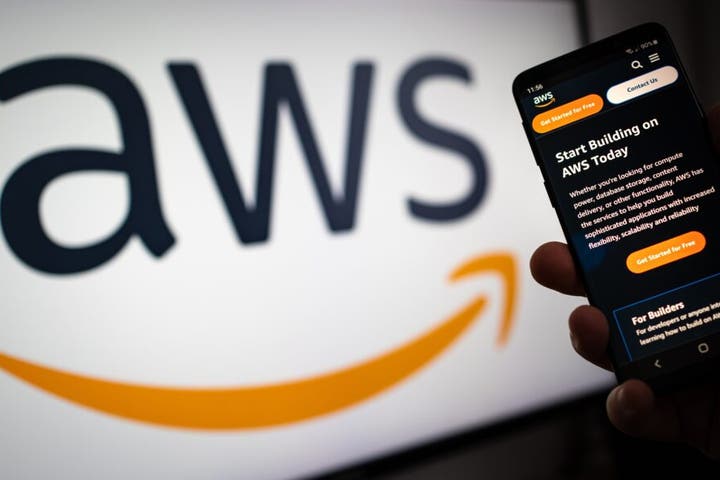Technology
Amazon Web Services Outage Raises Concerns Over AI Dependence

Last week, a significant outage at Amazon Web Services (AWS) disrupted operations for numerous companies worldwide, highlighting the heavy reliance on a limited number of internet infrastructure providers. This incident has raised alarms among experts regarding the increasing dependence on cloud-based services, particularly as organizations continue to integrate artificial intelligence into their operations.
The outage serves as a stark reminder of how vulnerable businesses can be when faced with service interruptions from major providers. As noted by a recent survey conducted by McKinsey & Company, the use of AI across organizations has surged, with 78% of companies employing AI in at least one business function, up from 55% in 2023. This trend indicates a rapid shift towards AI technologies performing tasks traditionally managed by humans.
Experts Warn of Performance Risks
The reliance on AI for critical functions brings inherent risks. In an interview, Tim DeStefano, Associate Research Professor at Georgetown University McDonough School of Business, emphasized the potential impact of outages on organizational performance. “If there’s an outage and you rely on AI to make your decisions and you can’t access it, that’s going to have an effect on performance,” he stated. DeStefano underscores that “cloud computing represents a technological prerequisite for using AI,” indicating that without stable infrastructure, AI’s effectiveness is compromised.
AWS holds a dominant position in the cloud computing market, capturing nearly 38% of the share in 2024, according to a report from Gartner. Following AWS are Microsoft with 24% and Google at 9%. This consolidation means that a single outage can reverberate across multiple sectors, disrupting services that many businesses have come to depend on.
Future of AI and Cloud Services
According to Jacob Bourne, a technology analyst at eMarketer, the top three cloud providers are also leading in AI application support. Despite their substantial investments in data centers to meet the rising demand for AI capabilities, concerns linger about whether this infrastructure will sufficiently support future needs. Bourne noted, “AI usage is the dream, but if something goes wrong and you don’t have that human intelligence that’s up to speed, then we’re really offloading all of these critical tasks to AI and putting a lot of trust in the technology.”
Yet, not all is lost. Smaller cloud computing companies such as Oracle and CoreWeave are gaining traction with their AI-specific offerings. Additionally, tech giants like Meta and OpenAI are investing in their own data centers, which could reduce the strain on shared cloud services. Bourne commented, “There is a pathway to make AI serve us in the best possible ways. It doesn’t necessarily seem like we’re on that pathway, though.”
As businesses continue to navigate the complexities of integrating AI into their operations, the recent AWS outage serves as a critical reminder of the importance of robust infrastructure. The future may hold great promise for AI, but the risks associated with dependence on centralized cloud services must be carefully managed to ensure resilience in an increasingly digital world.
-

 Technology4 months ago
Technology4 months agoDiscover the Top 10 Calorie Counting Apps of 2025
-

 Health2 months ago
Health2 months agoBella Hadid Shares Health Update After Treatment for Lyme Disease
-

 Health3 months ago
Health3 months agoErin Bates Shares Recovery Update Following Sepsis Complications
-

 Technology3 weeks ago
Technology3 weeks agoDiscover 2025’s Top GPUs for Exceptional 4K Gaming Performance
-

 Technology2 months ago
Technology2 months agoElectric Moto Influencer Surronster Arrested in Tijuana
-

 Technology4 months ago
Technology4 months agoDiscover How to Reverse Image Search Using ChatGPT Effortlessly
-

 Technology4 months ago
Technology4 months agoMeta Initiates $60B AI Data Center Expansion, Starting in Ohio
-

 Technology4 months ago
Technology4 months agoRecovering a Suspended TikTok Account: A Step-by-Step Guide
-

 Health4 months ago
Health4 months agoTested: Rab Firewall Mountain Jacket Survives Harsh Conditions
-

 Lifestyle4 months ago
Lifestyle4 months agoBelton Family Reunites After Daughter Survives Hill Country Floods
-

 Technology3 months ago
Technology3 months agoUncovering the Top Five Most Challenging Motorcycles to Ride
-

 Technology4 weeks ago
Technology4 weeks agoDiscover the Best Wireless Earbuds for Every Lifestyle















